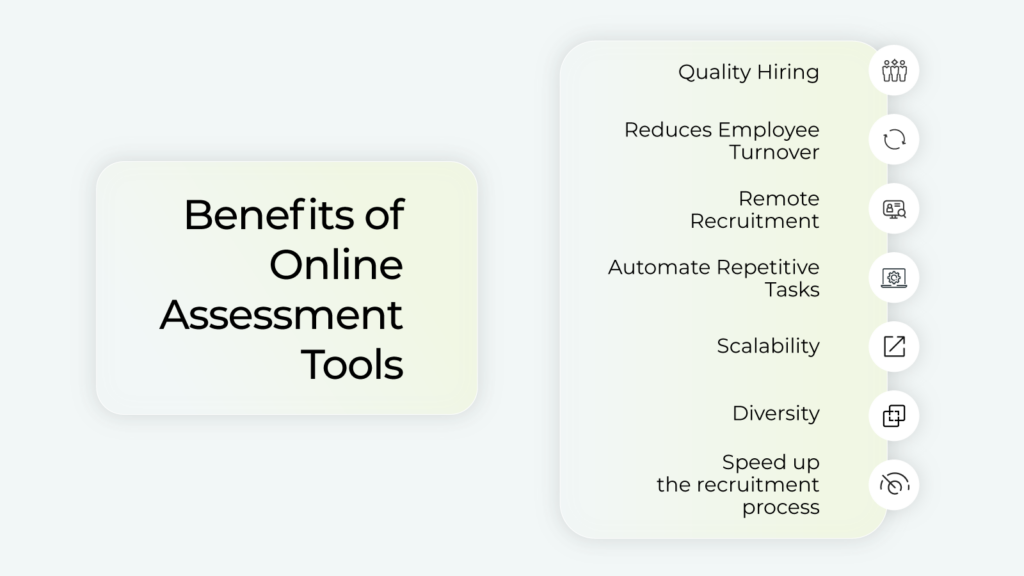
기술 평가 소프트웨어의 부상

Finding the perfect candidate feels like searching for a needle in a haystack. You’re tired of sifting through countless resumes, hoping to strike gold. What if I told you there’s a smarter way to pinpoint top talent? Let’s dive into the world of technical assessment software and explore how it’s revolutionizing modern recruitment.
Introduction to technical assessment software
Technical assessment software has quickly become a game-changer for recruiters and hiring managers, especially when it comes to evaluating candidates for technical roles. This innovative software provides a structured and objective way to assess candidates’ technical skills, knowledge, and problem-solving abilities. By using this software, you gain deeper insights into a candidate’s true capabilities, going beyond the limitations of a traditional resume.
The role of technical assessment software in modern hiring processes
Companies need a reliable way to differentiate candidates and identify those with the right skills for their technical teams. Technical assessment software steps in to streamline the screening process. It allows recruiters to create customized assessments tailored to the specific requirements of each role, ensuring that only the most qualified individuals move forward in the hiring process.
Evolution and significance in the digital age
The rise of remote work and the increasing demand for skilled tech professionals have made technical assessment software more critical than ever. As companies embrace digital transformation, they require tools that can efficiently and accurately evaluate candidates’ technical abilities, regardless of location. This evolution allows businesses to make informed hiring decisions.

Critical factors for choosing the right technical assessment software
You’re ready to streamline your hiring process and make data-driven decisions. That’s awesome! Choosing the right technical assessment software can be a game-changer for your recruitment strategy. However, with a plethora of options available, it’s important to carefully evaluate your needs and consider some critical factors before making a decision.
Assessment accuracy and relevance
First and foremost, the technical assessment software you choose must effectively evaluate the specific skills and knowledge required for the technical roles you’re looking to fill. Look for software that offers a wide range of pre-built assessments or the flexibility to customize tests according to your specific job requirements.
Moreover, ensure that the assessments are regularly updated to align with the latest industry trends and technologies. Outdated assessments can lead to inaccurate evaluations and potentially result in hiring candidates who lack the necessary skills.
User interface and candidate experience
The candidate experience during the assessment process is crucial. A positive experience can enhance your employer brand and attract top talent.
Therefore, prioritize technical assessment software with a user-friendly interface that is intuitive and easy to navigate for both recruiters and candidates. The platform should be mobile-responsive, allowing candidates to complete assessments conveniently from their preferred devices. A clunky and frustrating assessment experience can lead to candidate drop-off and harm your ability to attract the best talent.
Cost-effectiveness and ROI analysis
Investing in technical assessment software is a strategic decision for any organization. It’s essential to consider the cost-effectiveness of the software and its potential return on investment (ROI).
Evaluate the pricing models of different vendors and compare them with the features and benefits they offer. Look for software that provides robust reporting and analytics capabilities, allowing you to track key metrics such as time-to-hire, cost-per-hire, and the effectiveness of your assessments in identifying top performers. By analyzing these metrics, you can measure the impact of the software on your hiring process and demonstrate its ROI to stakeholders.
Integration capabilities with existing HR technologies
To further streamline your workflow, look for technical assessment software that seamlessly integrates with your existing HR technologies, such as your Applicant Tracking System (ATS) or Human Resource Management System (HRMS).
Integration between systems can automate data flow, reduce manual effort, and provide a centralized view of candidate information. This streamlines the entire recruitment process, from application to onboarding. For instance, integrating your assessment software with your ATS can automate the process of sending assessments to candidates and updating their profiles with the results.
The evolution of recruitment
In bygone eras, the hiring landscape looked remarkably different than it does in our current times. Recruitment methodologies were primarily rooted in an individual’s gut feeling, their network of personal relationships, and rudimentary appraisal techniques.
The essence of hiring often boils down to a hiring manager’s intuition, a recommendation from a trusted associate, or the candidate’s ability to present themselves well in a brief interaction.
Traditional methods
Traditional methods were simplistic, to say the least. The revered face-to-face interview, often conducted in an office setting with the candidate and interviewer sitting across a polished wooden desk, was seen as the gold standard.
It was an environment where first impressions were paramount, and one’s ability to articulate and present oneself often held more weight than actual competencies.
Alongside these interactions, paper-based tests, replete with multiple-choice questions or subjective queries, sought to gauge a candidate’s knowledge and expertise.
These methods, while effective to a degree, were not without their flaws. They were susceptible to biases, lacked depth in evaluation, and often missed out on assessing the candidate’s potential and adaptability.
Now, as we navigate the complexities of the 21st century, the recruitment domain has witnessed a paradigm shift.

Modern alternatives
The age of modern solutions is upon us, characterized by a blend of technology, data-driven methodologies, and a renewed focus on holistic candidate evaluation.
Today’s hiring practices are no longer confined to the rigid boundaries of yesteryears.
They champion efficiency, ensuring that organizations can sift through vast pools of candidates swiftly, pinpointing potential fits with precision.
Accuracy is another hallmark, with advanced assessment tools offering insights into a candidate’s capabilities, far beyond what traditional interviews could discern.
But perhaps the most commendable evolution in modern hiring is its emphasis on inclusivity. Gone are the days when candidates were judged solely on their credentials or the universities they hailed from.
Modern recruitment celebrates diversity, recognizing that talent knows no boundaries.
It understands that innovation and progress stem from a medley of perspectives, backgrounds, and experiences. Thus, contemporary hiring tools and practices are designed to cast a wider net, ensuring that everyone gets a fair shot, and talent is recognized and rewarded, irrespective of its origin.
Understanding technical assessment software
Delving into the realm of modern recruitment tools, one might wonder, what is this revolutionary instrument that’s creating waves in the hiring domain?
At its core, this digital marvel is meticulously engineered to scrutinize and assess the technical prowess and know-how of potential candidates. It’s not just another software; it’s a transformative approach to hiring, ensuring that companies onboard individuals who truly resonate with the technical demands of the job.
But what makes this software stand out? What sets it apart from the myriad of other recruitment tools flooding the market? The answer lies in its Key Features, which are nothing short of groundbreaking.
First and foremost, the adaptability of this tool is unmatched. It offers customizable tests, allowing recruiters and organizations to tailor assessments according to the specific requirements of the role. Whether you’re hiring a data scientist, a software developer, or a network engineer, the software can be modified to evaluate the unique skill sets pertinent to each role.
Another standout feature is its ability to provide real-time feedback. Gone are the days when candidates had to wait for weeks, anxiously wondering how they performed.
With technical assessment software, as soon as a candidate completes the test, they receive instantaneous feedback.
This not only enhances the candidate experience but also accelerates the hiring cycle, enabling companies to make swift and informed decisions.

However, the true essence of this software’s brilliance is its in-depth analytics. It’s not just about determining whether a candidate passed or failed.
The software dives deep, analyzing each response, evaluating patterns, and offering insights into the candidate’s strengths, weaknesses, and areas of potential.
Recruiters can access comprehensive reports, making it easier to compare candidates, understand their proficiencies, and ultimately, select the individual best suited for the role.
In essence, Technical Assessment Software isn’t just a tool; it’s the future of technical recruitment, ensuring that organizations harness the power of technology to make accurate, efficient, and inclusive hiring decisions.
Benefits of using technical assessment software
Companies are perpetually on the hunt for tools and strategies that can give them an edge, especially when it comes to recruiting top-tier talent.
Among the arsenal of modern recruitment tools, technical assessment software has emerged as a game-changer for organizations that have chosen to integrate it into their hiring processes. The results? A plethora of benefits have transformed the very essence of recruitment.
First and foremost, companies are relishing the boon of accurate skill evaluation. The days of relying on gut feelings, superficial interviews, or overemphasizing the weight of a resume are long gone.
With this advanced software, recruiters can delve deep into a candidate’s technical acumen, gauging their proficiency with precision and clarity. It’s akin to having a magnifying glass that offers a clear, unobstructed view of a candidate’s capabilities. There’s no ambiguity, no second-guessing. Recruiters and hiring managers can now ascertain, with confidence, the depth and breadth of a candidate’s skills.
Another significant advantage that companies are capitalizing on is the efficient screening process. Traditional hiring methodologies, often drawn-out and cumbersome, would sometimes take weeks or even months, with no guarantee of finding the ideal candidate. With the advent of technical assessment software, this narrative has shifted dramatically.
The software streamlines the screening process, automating various stages, and drastically reducing the time it takes to filter through potential hires.
It’s efficiency redefined, allowing companies to swiftly move through large talent pools and zero in on potential fits.
But the benefits don’t stop there. In an age where data is king, this software offers a treasure trove of insights. Every assessment, every response, and every interaction within the platform is recorded, analyzed, and presented in a digestible format.
This wealth of information paves the way for Data-driven decisions. Companies can now base their hiring decisions on tangible data, eliminating biases and ensuring that the selected candidate truly aligns with the role’s demands.
It’s not just about filling a vacancy; it’s about ensuring that the individual onboarded will seamlessly integrate into the team, contributing positively to the company’s objectives.
In summation, for companies that have adopted Technical assessment software, the rewards have been multifaceted.
It’s a testament to the power of technology in revolutionizing recruitment, emphasizing accuracy, efficiency, and data-centric decision-making.

Incorporating diversity and inclusion
The realm of recruitment, while primarily focused on sourcing the best talent, also carries the weighty responsibility of shaping the very fabric of an organization’s culture. One dimension of this culture, which often doesn’t receive its due spotlight, is the commitment to fostering a diverse and inclusive workforce.
Diversity, in all its forms—be it gender, ethnicity, age, or background—enriches the workplace, bringing a medley of perspectives, ideas, and experiences that drive innovation and foster collaboration.
However, achieving this diverse blend is easier said than done. Traditional recruitment processes have, knowingly or unknowingly, been riddled with biases.
Whether it’s the unconscious preference for a certain university, gender, or even name, these biases can skew hiring decisions, depriving the organization of potential talent and leading to a homogenized workforce.
This is where Technical Assessment Software steps in as a beacon of change. One of its standout features is its ability to offer Bias-Free Assessments.
By focusing purely on a candidate’s technical abilities and skills, the software eliminates subjective biases that might creep into human evaluations.
It doesn’t matter where the candidate went to school, what their name is, or their personal background; all that matters is their proficiency in the task at hand. This objectivity ensures that every candidate is judged solely on merit, creating a level playing field.
But the impact of technical assessment software goes beyond just neutral evaluations. It’s a tool that actively champions the cause of Promoting Equal Opportunities.
It’s not about meeting quotas or superficially diversifying the workforce. It’s about genuinely recognizing talent in all its forms and ensuring that every individual, regardless of their background, has an equal shot at proving their worth. The software underscores the principle that opportunities shouldn’t be a privilege but a right for every candidate.
In essence, while technical assessment software is lauded for its efficacy in gauging technical prowess, its role in catalyzing a shift towards more inclusive recruitment practices is equally commendable. It serves as a reminder that in the quest for talent, fairness and equality should always be at the forefront.
Case study: Jonah group’s transformation in technical assessments with DevSkiller
Company overview
- Company: Jonah Group
- Industry: Computer Software
- Founded: 2001
- Employees: 126
- Location: Toronto, Ontario
The Jonah Group, a renowned name in the computer software industry, historically relied on in-person assessments for evaluating technical candidates. These evaluations were not only time-consuming, often taking 5-7 days for a candidate to visit their facility, but also posed logistical challenges, particularly with scheduling. The traditional assessment method was primitive, almost akin to pen and paper, with candidates having limited resources, notably no internet access. The onset of the COVID-19 pandemic further exacerbated the inefficiencies and impracticalities of this approach.
Key challenges
- Inefficient use of non-billable hours.
- Undue pressure on the development team to grade assessments.
- Scheduling conflicts for candidate assessments.
- Extended processing times for candidates.
- Concerns over plagiarism.
The DevSkiller solution
Recognizing the need for a more streamlined and efficient assessment process, Jonah Group integrated DevSkiller’s state-of-the-art software. With DevSkiller, candidates were provided a more flexible window of 3 days to complete their assessments, which were then automatically graded, significantly reducing the overall processing time.
Key benefits
- Cost Savings: For every candidate assessed through DevSkiller, the Jonah Group saved $200, accounting for productivity loss and report writing time.
- Efficiency: The automatic grading feature of DevSkiller reduced the time taken to process candidate assessments from 5-7 days to just 3-5 days.
- Flexibility: The “3-Day Rule” implemented by Jonah Group allowed candidates a more extended period to complete assessments, ensuring higher completion rates.
Results and feedback
George Psofimis, Senior Manager of Recruitment at Jonah Group, praised the transformative impact of DevSkiller on their assessment process. The platform’s automation capabilities not only shortened the time taken to process candidates but also allowed for real-time assessment invitations, maximizing completion rates.
Moreover, with DevSkiller’s built-in IDE, candidates faced fewer instances of timing out, leading to a more seamless assessment experience. Jonah Group also benefited from DevSkiller’s customization capabilities, with the ability to tailor tests depending on roles and seniority levels.
Key Outcomes
- $20,000 saved per quarter.
- Enhanced candidate experience.
- Reduced manual intervention due to automation.
- Customizable tests, tailored to specific roles and experience levels.
- Efficient fraud prevention and plagiarism features.
The Jonah Group’s transition to DevSkiller underscores the transformative potential of advanced assessment platforms in the modern recruitment landscape. By addressing the inherent challenges of traditional assessment methods and introducing a suite of advanced features, DevSkiller has positioned itself as an invaluable tool for companies seeking a holistic and efficient candidate evaluation process.
Potential challenges and solutions
The adoption of Technical Assessment Software in recruitment, despite its manifold advantages, is not exempt from this duality. Like any tool or solution, it comes with its set of challenges and concerns that businesses need to be wary of.
One of the foremost Common Concerns is the specter of technical glitches. In an age where software forms the backbone of many business operations, technical hiccups can throw a spanner in the works. Imagine a scenario where a candidate is midway through an assessment, and the software crashes, or there’s an unexpected error that disrupts the process. Not only can this be frustrating for the candidate, but it also poses logistical challenges for recruiters who then have to reschedule or reassess.
Another concern that often surfaces is the potential misalignment of the software with a company’s specific needs. While technical assessment tools come packed with features, there’s no one-size-fits-all. A software perfect for a tech giant might be overkill for a startup, or a tool ideal for assessing data scientists might miss the mark for graphic designers. The risk here is investing in a platform that, while impressive on paper, doesn’t truly resonate with the company’s hiring requirements.

However, it’s crucial to understand that while these challenges exist, they’re by no means insurmountable. The key lies in being proactive rather than reactive. By adhering to Best Practices, companies can mitigate most of these concerns. This includes conducting thorough due diligence before selecting a software, understanding its features, scalability, and support structures. Reading reviews, seeking feedback from peers in the industry, and opting for trial versions can give a clearer picture of the software’s reliability and fit.
Furthermore, choosing established and reliable software providers can significantly diminish the chances of technical glitches. Established providers often have a track record of stability, regular updates, and robust customer support to address any issues.
In conclusion, while the path to integrating technical assessment software might have its bumps, with a thoughtful approach and informed choices, the journey can be made smooth, leading to the ultimate destination of efficient and effective recruitment.
Future of technical assessment software
The world of recruitment, much like the broader business ecosystem, is in a state of constant flux. As industries evolve, so do the methodologies and tools that drive their operations. Recruitment, being a pivotal function, has seen its fair share of transformations, and at the heart of this metamorphosis in recent times lies the Technical Assessment Software.
But what does the future hold for this already revolutionary tool? To answer that, we need to look at the broader technological trends shaping our world. Two juggernauts stand out: AI (Artificial Intelligence) and Automation.
AI, with its ability to process vast amounts of data, learn patterns, and make informed decisions, promises to supercharge technical assessment software. Instead of static evaluations, we can anticipate assessments that adapt in real-time. For instance, if a candidate aces the initial questions, the AI might automatically adjust the difficulty level, ensuring that the test remains challenging and provides a true measure of the candidate’s abilities. Conversely, if a candidate struggles, the AI could offer remedial questions, ensuring the assessment is fair and not unduly discouraging.

Automation, on the other hand, promises efficiency. Imagine a system where, based on a candidate’s resume, portfolio, or application, the software automatically curates a customized assessment. This not only saves time but also ensures that each assessment is laser-focused on gauging the exact skills and knowledge relevant to the candidate’s background and the job’s requirements.
This brings us to a tantalizing prospect: Personalized Assessments. In a world fueled by personalization, from online shopping to content consumption, why should recruitment be any different? The future might see assessments that are tailor-made for each candidate, meticulously crafted to evaluate their unique strengths and pinpoint areas of improvement. No longer will candidates feel they are being subjected to generic tests. Instead, they’ll engage with assessments that resonate with their expertise, experiences, and aspirations.
In this envisioned future, a graphic designer won’t just be tested on generic design principles but might face real-world scenarios specific to their niche, be it UI/UX design, print media, or digital illustrations. Similarly, a software developer’s assessment could be tailored based on their proficiencies, whether it’s frontend development, backend architectures, or specific programming languages.
In conclusion, as we stand on the cusp of this exciting new era in recruitment, the fusion of AI, automation, and the ethos of personalization promises to redefine how we evaluate talent. The future of technical assessment software, much like the candidates it evaluates, is brimming with potential.
결론
The trajectory of recruitment has been an intriguing one. From the traditional methods of hand-picking resumes and relying on instinctive judgments, we have witnessed a seismic shift in how talent is sourced, evaluated, and onboarded. At the epicenter of this transformation stands the Technical Assessment Software, a tool that has redefined the contours of modern hiring.
To label the ascent of technical assessment software as merely a ‘trend’ would be a gross understatement. It’s not just another blip on the recruitment radar or a fleeting fad that will be overshadowed by the next big thing. No, it’s a veritable revolution. It represents a fundamental change in the way companies approach the intricate process of talent acquisition.
Why is this shift so monumental? The answer lies in the broader zeitgeist of our times. We are in the throes of the digital age, a period characterized by the omnipresence of technology, the proliferation of data, and the emphasis on analytics-driven decisions. The sheer volume of data available today is staggering, and it offers insights that were previously unimaginable. In such an era, relying solely on traditional recruitment methods is akin to navigating a bustling metropolis with an outdated map.
Technical assessment software, with its arsenal of features, is perfectly attuned to the demands of this digital age. It not only streamlines the recruitment process but does so with a precision and efficiency that human-centric methods can’t match. It offers objective evaluations, mitigates biases, and provides actionable insights, ensuring that the talent onboarded is genuinely the best fit for the role and the organization.
As we stand at this juncture, looking ahead at the future of recruitment, one thing is crystal clear: the digital, data-driven wave is not receding. It’s only going to swell, bringing with it newer challenges and opportunities. In such a landscape, embracing tools like technical assessment software isn’t just advisable; it’s imperative.
It’s not about hopping on the bandwagon of the latest tech innovation. It’s about future-proofing recruitment processes, ensuring that as the world becomes increasingly digital, our methods of sourcing talent remain relevant, robust, and revolutionary. In essence, as the recruitment realm evolves, technical assessment software is not just a tool in the recruiter’s kit; it’s the compass guiding the way.
Discover how DevSkiller technical assessment software can help you.
데모 예약하기 제품 전문가와 상담하거나 이 짧은 동영상을 시청하세요. 5분 데모 동영상 를 클릭해 자세히 알아보세요.
자주 묻는 질문
- What is Technical Assessment Software?
It’s a digital solution designed to evaluate a candidate’s technical skills. - How does it promote diversity and inclusion?
By offering bias-free assessments and promoting equal opportunities. - Are there any challenges in using this software?
Potential issues include tech glitches or alignment with company needs, but best practices can address these. - How does the future look for technical assessment software?
With advancements in AI and automation, we can expect even more efficient and personalized assessments. - Is it worth the investment for companies?
Absolutely. The benefits of accurate skill evaluation, efficiency, and data-driven decisions make it invaluable.




